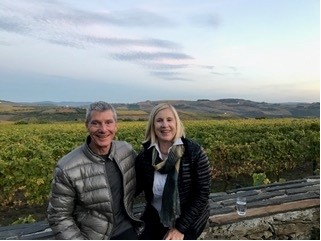Exceptional care leads couple to make exceptional gift to advance brain research
By John Bethel
How a health crisis inspired a legacy gift to the MUSC Foundation
 “The brain is one of the least understood organs in the body,” Michael DeBenedetti said. But Michael and his wife, Staige, are doing what they can to change that.
“The brain is one of the least understood organs in the body,” Michael DeBenedetti said. But Michael and his wife, Staige, are doing what they can to change that.
Their experience at the Medical University of South Carolina (MUSC) moved them to make a transformative commitment. The couple has established a charitable remainder unitrust, a type of planned gift that will one day provide significant funding for neurological research through the MUSC Neuroscience & Brain Health Institute, where experts collaborate across multiple disciplines to better understand and treat conditions affecting the brain.
Their decision to leave this lasting legacy began with a health scare.
Michael had begun experiencing troubling neurological symptoms. Doctors suspected normal pressure hydrocephalus (NPH) – a condition that affects brain function and can cause difficulties with walking and memory. That’s when Staige’s instincts kicked in – shaped by growing up in a family of physicians. Her father was a urologist trained at The Johns Hopkins Hospital, and her stepfather was an orthopedic surgeon trained at the Mayo Clinic.
Why the DeBenedettis chose to support brain research at MUSC
“I started Googling like a crazy woman,” Staige said. Her search led her to Lidia Bastos Yamada, M.D., a neurologist at MUSC. What impressed her most was Dr. Yamada’s commitment to comprehensive evaluation that confirmed their suspicion of NPH.
“I appreciated that thoughtful, step-by-step approach – especially when you’re dealing with the brain. It’s a big deal,” she explained.
That care-first approach led them to MUSC’s neurology and neurosurgery team, where they discovered much more than exceptional medical expertise. They found a community of professionals whose dedication and compassion would change their lives – and ultimately inspire their philanthropy.
Michael was struck by the energy and sense of purpose radiating from everyone they encountered. “The enthusiasm was incredible,” he reflects. “From the doctors to the nurses to the office staff, everyone was professional, dedicated and genuinely invested in their work.”
Discovering the power of academic medicine in South Carolina
One detail stood out above all: MUSC is South Carolina’s only comprehensive academic health system – a place where teaching, research and patient care all converge.
“The fact that you’re a teaching hospital is extremely important,” Michael said. “We need that as a society.”
Staige and Michael believe MUSC’s focus on brain research is vital – especially as people live longer and cognitive health becomes more central to quality of life. They wanted to help advance that work, now and into the future.
Planned giving to MUSC: A charitable remainder unitrust in action
Because they don’t have immediate family to inherit their estate, they had already been exploring how to create a philanthropic legacy. A charitable remainder unitrust – a giving vehicle that provides them with income for life, followed by a future gift to a charitable cause – was a perfect fit.
They had considered several nonprofits, but their experience at MUSC made the decision clear.
“We looked at each other and said, ‘Hey, we know where this needs to go,’” Staige said.
Their gift wasn’t just about gratitude. It was about recognizing a mission-driven institution that is growing, innovating and making a difference in people’s lives.
The path to South Carolina and a meaningful philanthropic investment
Michael and Staige’s path to South Carolina began nearly two decades ago, when they purchased property in Camden while living in the San Francisco Bay Area. After retiring, they made the permanent move east. In MUSC, they found the right place – and the right people – for a meaningful philanthropic investment in their new home state.
Their planned gift will support the MUSC Neuroscience & Brain Health Institute, which seeks to transform the understanding and management of brain health through research, education, clinical care and community outreach. The center’s proactive, evidence-based strategies aim to reduce the risk of conditions like dementia, Parkinson’s disease, stroke, migraines and autoimmune neurological disorders.
For Michael and Staige, what began as a health crisis evolved into a deeply personal journey of gratitude and purpose.
Their story is a powerful reminder of how life-changing care can lead to legacy-changing gifts. And how grateful hearts today can shape better outcomes for patients tomorrow.



.jpg)